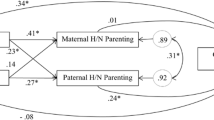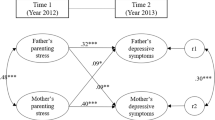Abstract
Although a developing body of literature suggests that depressive symptoms in fathers are related to child psychopathology, little evidence suggests that paternal depression plays a unique role in children’s symptoms. We used a high-risk design involving children of mothers with and without histories of depression to test the unique mediating role of father–child conflict in the relations between fathers’ depressive symptoms and child externalizing and internalizing symptoms. In all regression analyses, mothers’ history of depression and current depressive symptoms were controlled. Depressive symptoms in fathers were associated with child externalizing and internalizing symptoms, and father–child conflict. Father–child conflict mediated relations between fathers’ depressive symptoms and child externalizing symptoms above and beyond the effects of maternal depression history and depressive symptoms. The results suggest that negative interpersonal consequences of parental depression on child psychopathology may not be limited to mothers.


Similar content being viewed by others
References
Achenbach, T. M. (1991a). Manual for the child behavior checklist/4–18 and 1991 profile. Burlington, VT: Department of Psychiatry University of Vermont.
Achenbach, T. M. (1991b). Manual for the youth self-report and 1991 profile. Burlington, VT: Department of Psychiatry University of Vermont.
Allen, J. P., Porter, M., McFarland, C., McElhaney, K. B., & Marsh, P. (2007). The relation of attachment security to adolescents’ paternal and peer relationships, depression, and externalizing behavior. Child Development, 78, 1222–1239.
American Psychiatric Association. (1987). Diagnostic and statistical manual of mental disorders (3. ed. rev ). Washington, DC: Author.
Barber, B. K. (1996). Parental psychological control: Revisiting a neglected construct. Child Development, 67, 3296–3319.
Baron, R. M., & Kenny, D. A. (1986). The moderator-mediator variable distinction in social psychological research: Conceptual, strategic, and statistical considerations. Journal of Personality and Social Psychology, 51, 1173–1182.
Beardslee, W., Versage, E. M., & Gladstone, T. R. G. (1998). Children of affectively ill parents: A review of the past 10 years. Journal of the American Academy of Child and Adolescent Psychiatry, 37, 1134–1141.
Beck, A. T., & Steer, R. A. (1987). Manual for the revised Beck Depression Inventory. San Antonio, TX: Psychological Corporation.
Conger, R. D., Patterson, G. R., & Ge, X. (1995). It takes two to replicate: A mediational model for the impact of parents’ stress on adolescent adjustment. Child Development, 66, 80–97.
Connell, A. M., & Goodman, S. H. (2002). The association between psychopathology in fathers versus mothers and children’s internalizing and externalizing behavior problems. Psychological Bulletin, 128, 746–773.
Coyne, J. C., Downey, G., & Boergers, J. (1991). Depression in families: A systems perspective. In D. Cicchetti & S.L.Toth (Eds.), Models and Integrations: The Rochester Symposium on Developmental Psychopathology (Vol. 3). Rochester, NY: University of Rochester Press.
Cummings, E. M., & Davies, P. T. (1999). Depressed parents and family functioning: Interpersonal effects and children’s functioning and development. In T. Joiner & J. C. Coyne (Eds.), The interactional nature of depression: Advances in interpersonal approaches (pp. 299–327). Washington, DC: APA.
De Los Reyes, A., & Kazdin, A. E. (2005). Informant discrepancies in assessment in childhood psychopathology: A critical review. Psychological Bulletin, 131, 483–509.
Deater-Deckard, K., Dodge, K. A., Bates, J. E., & Pettit, G. S. (1998). Multiple risk factors in the development of externalizing behavior problems: Group and individual differences. Development and Psychopathology, 10, 469–493.
Dodge, K. A. (1990). Developmental psychopathology in children of depressed mothers. Developmental Psychology, 26, 3–6.
Downey, G., & Coyne, J. C. (1990). Children of depressed parents: An integrative review. Psychological Bulletin, 108, 50–76.
Emery, R. E., Fincham, F. D., & Cummings, E. M. (1992). Parenting in context: Systemic thinking about parental conflict and its influence on children. Journal of Consulting and Clinical Psychology, 60, 909–912.
Fendrich, M., Warner, V., & Weissman, M. M. (1990). Family risk factors, parental depression, and psychopathology in offspring. Developmental Psychology, 26, 40–50.
Forehand, R., Long, N., Brody, G. H., & Fauber, R. (1986). Home predictors of young adolescents’ school behavior and academic performance. Child Development, 57, 1528–1533.
Garber, J., Robinson, N. R., & Valentiner, D. (1997). The relation between parenting and adolescent depression: Self-worth as a mediator. Journal of Adolescent Research, 12, 12–33.
Gazelle, H., & Rudolph, K. D. (2004). Moving toward and away from the world: Social approach and avoidance trajectories in anxious solitary youth. Child Development, 75, 829–849.
Ge, X., Conger, R., Lorenz, F., & Simons, R. (1994). Parents’ stressful life events and adolescent depressed mood. Journal of Health and Social Behavior, 35, 28–44.
Goodman, S. H., Adamson, L. B., Riniti, J., & Cole, S. (1994). Mothers’ expressed attitudes: Associations with maternal depression and children’s self esteem and psychopathology. Journal of the American Academy of Child and Adolescent Psychiatry, 33, 1265–1274.
Goodman, S. H., & Gotlib, I. H. (1999). Risk for psychopathology in the children of depressed mothers: A developmental model for understanding mechanisms of transmission. Psychological Review, 106, 458–490.
Grych, J. H., & Fincham, F. D. (1990). Marital conflict and children’s adjustment. Psychological Bulletin, 108, 267–290.
Hammen, C. (1991). Depression runs in families: The social context of risk and resilience in children of depressed mothers. New York: Springer-Verlag.
Hollingshead, A. A. (1979). Four factor index of social status. New Haven, CT: Yale University.
Holmbeck, G. N. (2002). Post-hoc probing of significant moderational and mediational effects in studies of pediatric populations. Journal of Pediatric Psychology, 27, 87–96.
Hosley, C. A., & Montemayor, R. (1997). Fathers and adolescents. In M. E. Lamb (Ed.), The role of the father in child development (3rd ed., pp. 162–178). New York: Wiley.
Jacob, T., & Johnson, S. L. (1997). Parent–child interaction among depressed fathers and mothers: Impact on child functioning. Journal of Family Psychology, 11, 391–409.
Kane, P., & Garber, J. (2004). The relations among depression in fathers, children’s psychopathology, and father–child conflict: A meta-analysis. Clinical Psychology Review, 24, 339–360.
Kim-Cohen, J., Moffitt, T. E., Taylor, A., Pawlby, S. J., & Caspi, A. (2005). Maternal depression and children’s antisocial behavior: Nature and nurture effects. Archives of General Psychiatry, 62, 173–181.
Lovejoy, M. C., Graczyk, P. A., O’Hare, E., & Neuman, G. (2000). Maternal depression and parenting behavior. Clinical Psychology Review, 20, 561–592.
Marchand, J. F., & Hock, E. (1998). The relation of problem behaviors in preschool children to depressive symptoms in mothers and fathers. Journal of Genetic Psychology, 159, 353–366.
McGuffin, P., Katz, R., Watkins, S., & Rutherford, J. (1996). A hospital-based twin register of the heritability of DSM-IV unipolar depression. Archives of General Psychiatry, 53, 129–136.
McLeod, J. D. (1993). Spouse concordance for depressive disorders in a community sample. Journal of Affective Disorders, 27, 43–52.
Montemayor, R. (1982). The relationship between parent–adolescent conflict and the amount of time spent alone and with parents and peers. Child Development, 53, 1512–1519.
Phares, V. (1997). Psychological adjustment, maladjustment, and father–child relationships. In M. Lamb (Ed.), The role of the father in child development (pp. 261–283). New York, NY: Wiley.
Prinz, R. J., Foster, S., Kent, R. N., & O’Leary, K. D. (1979). Multivariate assessment of conflict in distressed and non-distressed mother-adolescent dyads. Journal of Applied Behavior Analysis, 12, 691–770.
Radke-Yarrow, M., Nottelman, E., Martinez, P., Fox, M. B., & Belmont, B. (1992). Young children of affectively ill parents: A longitudinal study of psychosocial development. Journal of the American Academy of Child and Adolescent Psychiatry, 31, 68–77.
Ramchandani, P., Stein, A., Evans, J., O’Connor, T. G., & Group, A. (2005). Paternal depression in the postnatal period and child development: A propsective population study. Lancet, 365, 2201–2205.
Robin, A. L., & Foster, S. L. (1989). Negotiating parent–adolescent conflict: A behavioral-family systems approach. New York: Guilford Press.
Rudolph, K. D., Hammen, C., Burge, D., Lindberg, N., Hertzberg, D., & Daley, S. E. (2000). Toward an interpersonal life stress model of depression: The developmental context of stress generation. Development and Psychopathology, 12, 215–234.
Rutter, M. (2000). Psychosocial influences: Critiques, findings, and research needs. Development and Psychopathology, 12, 375–405.
Sameroff, A. J. (2000). Developmental systems and psychopathology. Development and Psychopathology, 12, 297–312.
Sheeber, L. B., Hops, H., & Davis, B. (2001). Family processes in adolescent depression. Clinical Child and Family Psychology Review, 4, 19–35.
Sobel, M. E. (1988). Direct and indirect effects in linear structural equation models. In J. S. Long (Ed.), Common problems/proper solutions: Avoiding error in quantitative research (pp. 46–64). Beverly Hills: Sage.
Spitzer, R. L., Williams, J. B. W., Gibbon, M., & First, M. B. (1990). User’s guide for the structured clinical interview for the DSM-III-R. Washington, DC: American Psychiatric Press.
Toth, S. L., Rogosch, F. A., Manly, J. T., & Cicchetti, D. (2006). The efficacy of toddler- parent psychotherapy to reorganize attachment in the young offspring of mothers with major depressive disorder: A randomized preventive trial. Journal of Consulting and Clinical Psychology, 74, 1006–1016.
Weiss, B., Dodge, K. A., Bates, J. E., & Pettit, G. S. (1992). Some consequences of early harsh discipline: Child aggression and a maladaptive social information processing style. Child Development, 63, 1321–1335.
Weissman, M. M., Warner, V., Wickramaratne, P., Moreau, D., & Olfson, M. (1997). Offspring of depressed parents: 10 years later. Archives of General Psychiatry, 54, 932–940.
Author information
Authors and Affiliations
Corresponding author
Rights and permissions
About this article
Cite this article
Kane, P., Garber, J. Parental Depression and Child Externalizing and Internalizing Symptoms: Unique Effects of Fathers’ Symptoms and Perceived Conflict as a Mediator. J Child Fam Stud 18, 465–472 (2009). https://doi.org/10.1007/s10826-008-9250-x
Received:
Accepted:
Published:
Issue Date:
DOI: https://doi.org/10.1007/s10826-008-9250-x




